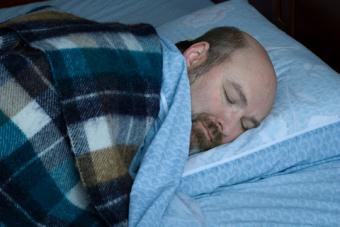
Parents of teenagers are likely to realize that their children may routinely not be getting enough sleep, but they also may not know how to remedy the situation. The changes in biology combined with the day-to-day demands of academics, after school activities, work, and social and family obligations can significantly impact the number of hours teens have available to get a good night's rest. A large body of research addresses the issue of sleep deprivation in adolescents, and a number of suggestions for both parents and their children help increase the amount of sleep teens are getting each night.
How Much Sleep Do Adolescents Need?
Teenagers need between eight and ten hours of sleep per night, with nine and a quarter hours being optimal. In fact, teenagers need more sleep than do preteens or adults. According to the National Institute of Mental Health, one reason for this fact is that during the teen years, the brain is undergoing significant mental and physical development. The frontal cortex is developing a more sophisticated network by connecting increasingly complex synapses, and the body is maturing both sexually and physically. In addition, when teens are routinely unable to complete their sleep cycles, the hormones regulating growth and appetite are dysregulated, which may result in deficits overall. Sleep is essential to mental, physical, and cognitive wellbeing.
How Prevalent Is the Problem of Sleep Deprivation?
In 2005, The National Sleep Foundation conducted a survey of approximately 1,600 families evaluating the sleep habits of their adolescent children. They found that about 45 percent of adolescents get less than eight hours of sleep per night, 30 percent get a borderline amount of between eight and nine hours per night, and only about 20 percent get sufficient sleep.
The National Sleep Foundation study results prompted similar studies that support these findings, and they consistently show that chronic sleep loss in teens has become a major public health concern. Dr. Judith Owens, a pediatrician with the American Academy of Pediatrics, addresses the causes and consequences of adolescent sleep deprivation fully in a technical report published by the Academy in 2014. She notes that this new report not only addresses some of the concerns from earlier literature, but newer problems that have been identified, such as obesity and the overuse of caffeine and other stimulants.
In 2010, the American Medical Association also recognized the significance of teen sleep deprivation by adopting the American Academy of Sleep Medicine's resolution, which states, "a significant percentage of the adolescent population suffers from some degree of sleep deprivation, and that sleep deprivation is associated with a number of health problems, such as depression and obesity."
Despite the growing body of evidence pointing to the severity and high incidence of sleep loss in the nation's youth, there is hope. Though the problem may be widespread, it is remediable. A brief look at factors that contribute to sleep deprivation and some of its effects can help concerned parents come up with the best solutions for their child.
Factors that Contribute to Sleep Deprivation
The National Sleep Foundation recognizes that the relationship between teenagers, their academic and social lives, and their sleep patterns is a complex one. While social and academic obligations may certainly play a significant role in sleep deprivation, there are physiological factors that parents should be aware of, as well.
- At the onset of puberty, a shift occurs in the normal circadian rhythm of developing teens. The hormone melatonin, which acts as an internal signal for sleepiness, is secreted one to two hours later in the evening. This explains why many adolescents have difficulty falling asleep prior to 11:00 p.m., even when they are tired. Consequently, they are sleepier during the morning hours of school when they would ideally be more alert.
- Additionally, teens who use electronic media to send themselves off to sleep are likely sabotaging themselves. The blue light emitted from computers could be signaling the brain to remain active. Other environmental factors, like too much light or noise, can also influence sleep, though that evidence is more anecdotal than research-based at present.
Potential Effects of Sleep Deprivation
Chronic loss of sleep can cause of myriad of problems from mild to severe. Some of the most common problems are:
- Mood shifts - teens may be more irritable and grouchy, and they may be less able to regulate their mood
- Risk-taking behaviors - driving irresponsibly, drinking, or using other drugs may be more likely to occur when teens are sleep deprived
- Decision-making - sleep loss can contribute to poor decision-making and responding impulsively
- Impairments in memory
- Slower cognitive processing, which can impede academic performance
- Depression
- Slower physical reflexes
- Loss of focus, attention, and mental acuity
- Weight gain/obesity
Strategies for Getting More Sleep
Fortunately, teens and their parents may be able to employ strategies to help teens get more sleep.
Delay School Start Times
One of the most radical ideas to come out of the sleep deprivation research data is to delay school start times by at least an hour. According to the National Sleep Foundation study, teens who are biologically geared to begin sleeping at or past 11:00 p.m. are being required to get up for school at around 6:30 a.m., providing only seven and a half hours for sleep. Pushing school times later could remediate the problem significantly.
This has been implemented with great success in some districts. A Minnesota district that changed the high school start time from 7:15 a.m. to 8:40 a.m. reported that their students were less sleepy, got slightly higher grades, and experienced less depression. Despite the documented benefits, many schools and families are reluctant to make the change for a variety of reasons, including problems with scheduling, transportation, extracurricular activities, and work schedules. In the meantime, parents and teens may benefit from making some changes in their routines.
Discussion Between Parents and Teens
One of the best strategies for parents to encourage their teenagers to sleep more is to talk with them about their concerns, particularly if their child is struggling with sleep-related problems. In general, it is better not to mandate a bedtime or argue about or criticize their sleep habits. Taking a concerned and understanding approach is likely to achieve a better outcome in the long run. Together, you can evaluate the social and academic demands your teen is facing and determine whether any of them can be limited or eliminated without compromising their goals.
Develop Good Sleep Habits
Ensure that your actions are conducive to sleeping well. Teens should consider:
- Taking a 20-30 minute nap after school to recharge mentally and physically
- Completing homework and fun activities earlier in the evening and quieter activities like reading later in the evening
- Making the bedroom optimal for sleep by using blackout curtains and keeping it cool and dark
- Keeping a consistent schedule
- Striving for an earlier bedtime (try going to bed 10 minutes earlier each evening for a week or more, then make it 10 more minutes earlier until the desired earlier bedtime is achieved)
- Limiting caffeine use and consuming it earlier in the day
- Taking a hot shower or bath prior to bed
- Eating a high-carbohydrate snack just before bed (unless weight gain is a concern)
- Turning off electronics at least an hour before going to bed
- Catching up on sleep on the weekend by sleeping in
- Using quiet music to induce relaxation
Seek Medical Assistance
It is clear that getting the right amount of sleep is vital to development, but it can be difficult to pinpoint the problems related to getting adequate sleep. If you are concerned about your child's sleep habits and none of the above mentioned strategies are helping, talking with their physician is the next logical step. It may be beneficial for your teen to record his sleep habits for several weeks to help the doctor determine if there is more going on than too busy a schedule or too much caffeine.







